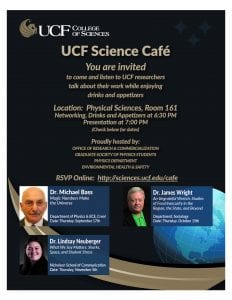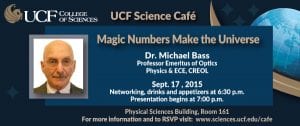2015-16 Science Café features Amazing Research
Science Café is designed to showcase UCF professors in a fun and casual environment. The fall 2015 series will span three months, September-November, with each month featuring a scientist from a different department in the university. Admission is free, but we encourage everyone to RSVP for this event in advance. Each speaker will begin their presentation at 7 p.m. so please arrive by 6:30 p.m. for drinks, appetizers and networking.
Held in the Physical Sciences Building, the series highlights the exciting research currently being conducted in the College of Sciences and CREOL-College of Optics and Photonics. Science Cafe is proudly hosted by the Office of Research & Commercialization, Graduate Society of Physics Students, the Physics Department, and Environment Health & Safety.
The speakers that will be featured in the series include:
Dr. Michael Bass, Emeritus Professor of Optics, Physics & ECE, CREOL
“Magic Numbers Make the Universe”
We live on a Newtonian world in an Einsteinian universe. Our observations tell us that the universe started in what we call a Big Bang about 13.8 billion years ago and has been expanding ever since. What is truly staggering is that our understandings of the largest and smallest come together into something called the Standard Model. Several numbers that characterize the universe, the values of several physical constants, have to be exactly what they are or else stars do not evolve. And, if stars do not evolve, neither do we. This talk is about the cosmology we have and the perhaps very unusual universe it leads us to think we are in.
Dr. Bass is Professor Emeritus of Optics at CREOL, the College of Optics & Photonics. From December 1987 until December 1992 he served as UCF’s Vice President for Research. Dr. Bass received his B.S. in Physics from Carnegie-Mellon University in 1960 and his M.S. in 1962 and his Ph. D. in 1964 in Physics from the University of Michigan. He is a Life Fellow of the Institute of Electrical and Electronics Engineers (IEEE), the Optical Society of America (OSA) and the Laser Institute of America (LIA). He was elected a Foreign Member of the Russian National Academy of Engineering Science in 1994. Is the 2014 recipient of the R. W. Wood Prize of the Optical Society of America and a 2013 Fellow of the National Academy of Inventors.
Dr. James Wright, Provost Distinguish Research Professor, Pegasus Professor, Department of Sociology
“An Ungrateful Wretch: Studies of Food Insecurity in the Region, the State, and Beyond“
Nearly a half century has passed since the CBS Reports documentary aired, and hunger in America has taken on a new face. Indeed, the very term “hunger” has receded from the public policy discussion; today’s debate concerns “food insecurity.” And instead of ten million or so people and a hunger rate of 5%, today’s food-insecure population is estimated at around 50 million people, or one American in six. My talk tonight attempts to tell the story of how we managed to get from one in twenty who were hungry to one in six who are food-insecure.
Dr. James D. Wright is an author, educator, and the Provost’s Distinguished Research Professor in the Department of Sociology at the University of Central Florida. Wright also serves as the Director of the UCF Institute for Social and Behavioral Sciences. He received his PhD from the University of Wisconsin in 1973 and taught at the University of Massachusetts, Amherst, and Tulane University before coming to UCF in 2001. His latest research monograph is Poor and Homeless in the Sunshine State: Down and Out in Theme Park Nation (written with Amy M. Donley). Wright is also the editor-in-chief of the International Encyclopedia of the Social and Behavioral Sciences, 2nd edition, published in 26 volumes by Elsevier in 2015. In addition to his University duties Dr. Wright is very active within the Orlando community. He has served as a member of the Board of Directors of the Coalition for the Homeless of Central Florida, the Homeless Services Network and the HOPE Helps Foundation in Oviedo just to name a few.
Dr. Lindsay Neuberger, Assistant Professor, Nicholson School of Communication
“What We Say Matters: Sharks, Space, and Student Stress”
Effective communication in, around, and about science is essential. This talk focuses on three seemingly unrelated topics: sharks, space, and students. The social scientific examination of communication patterns in these contexts can provide us with valuable information to affect health, increase quality of life, and strengthen program effectiveness. This talk provides diverse examples, discusses novel methodologies, and explains what communication can tell us if we listen carefully.
Dr. Lindsay Neuberger is an assistant professor of human communication at the Nicholson School of Communication. She earned her Ph.D. at Michigan State University and received bachelor’s and master’s degrees from Wake Forest University. Her research is focused on health campaigns and has covered diverse health issues including breast cancer, blood donation and nutrition. Specifically, Neuberger’s research investigates uncertainty, information seeking and persuasion in health campaigns. Dr. Neuberger’s research interests include:
- Health communication and literacy
- Health campaigns
- Campaign development and evaluation
- Risk communication
- Uncertainty and information seeking
- persuasion
- Health communication contexts: Breast cancer, blood donation, nutrition, gambling and smoking
Please join us for the upcoming Science Café talks.
To learn more about the Science Cafe and how to RSVP for the speaker series.


